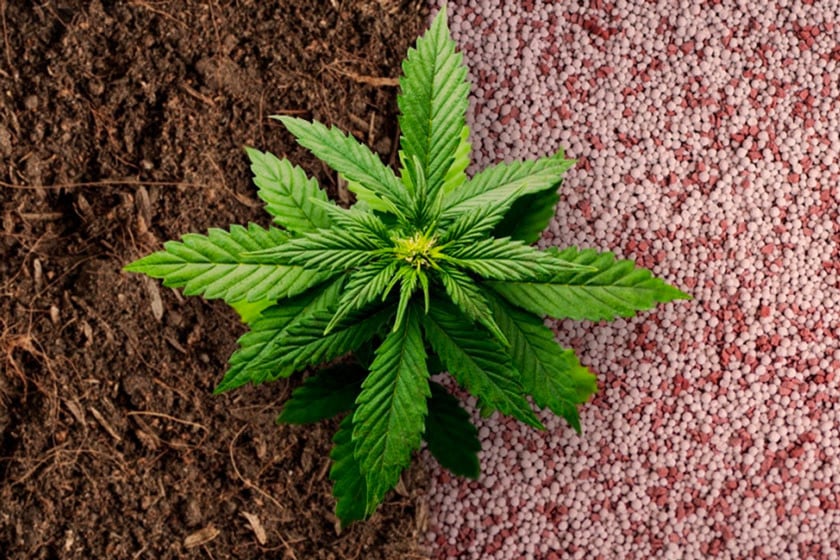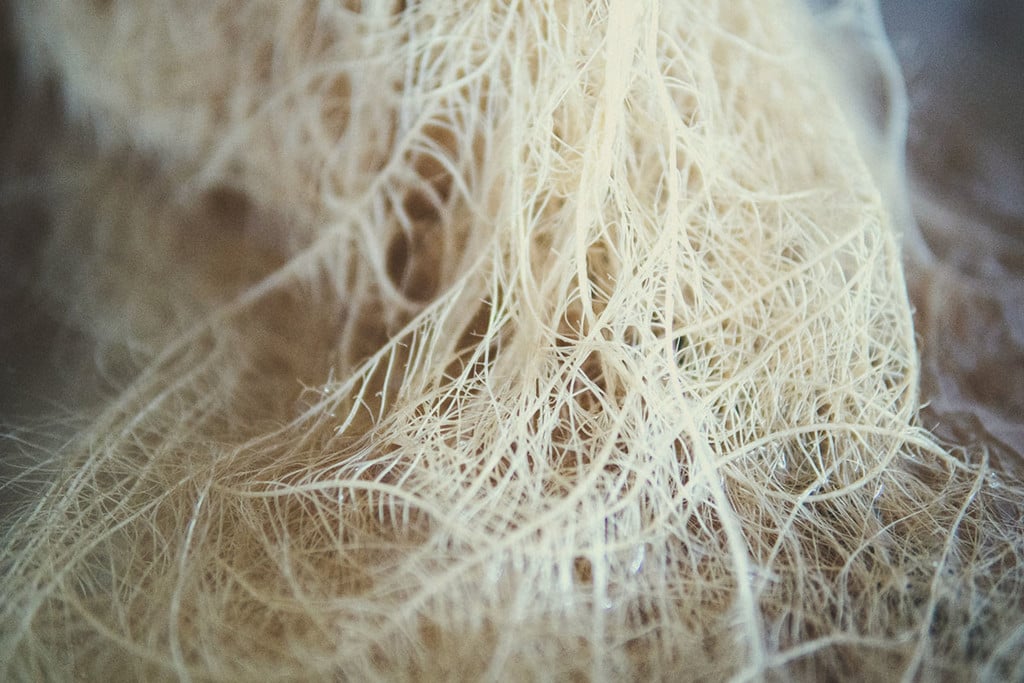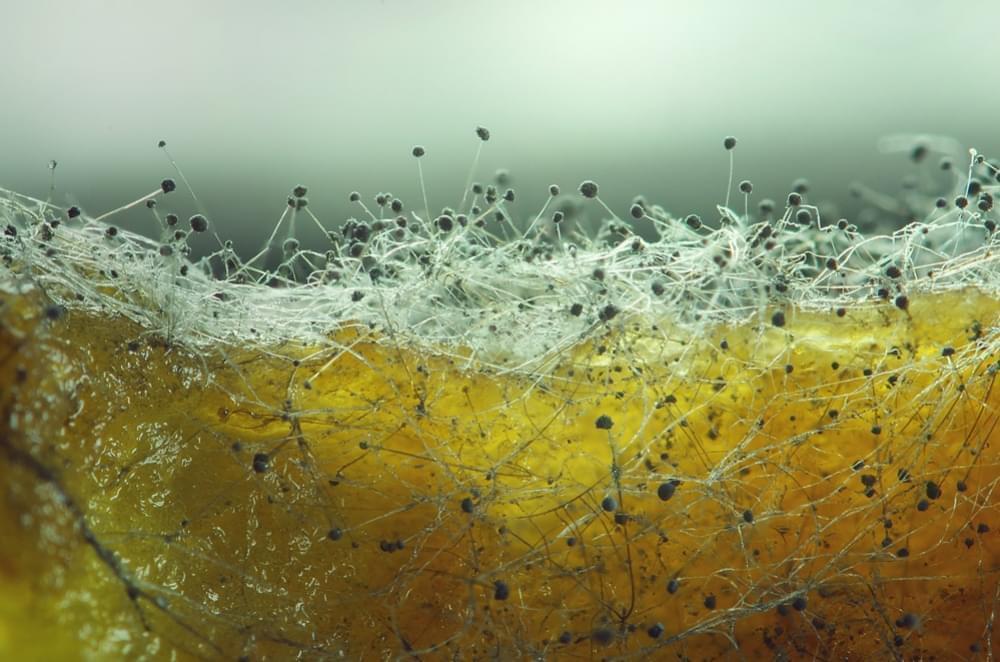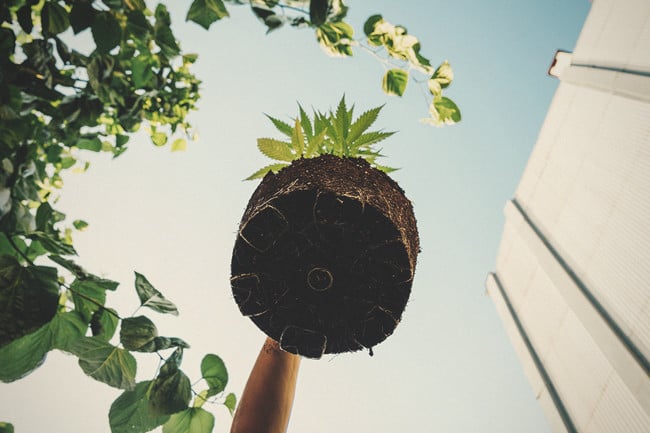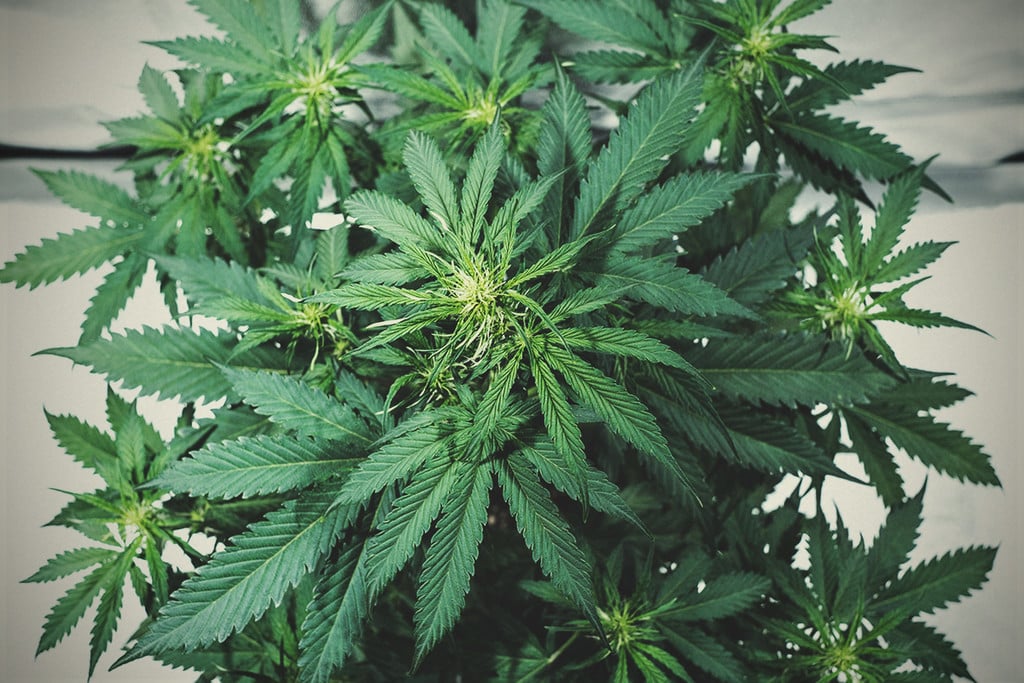.
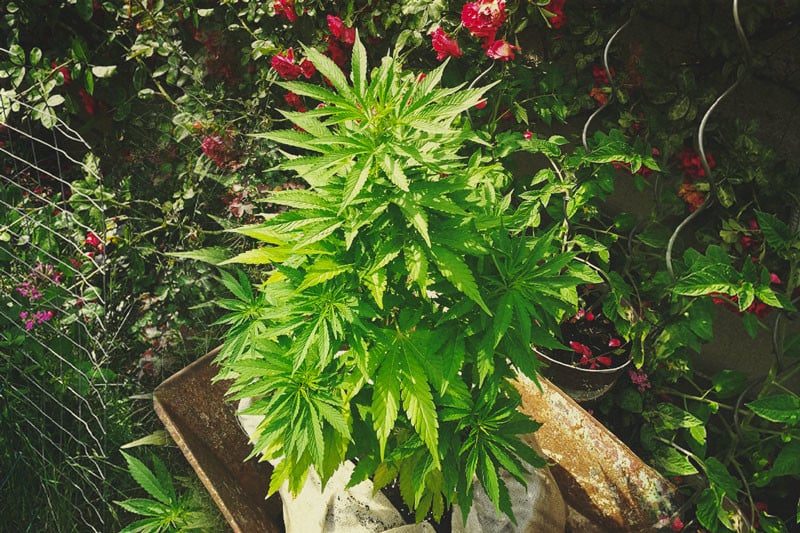
The Ultimate Guide To Growing Organic Cannabis
Growing cannabis organically is better for you, your soil, your garden, and the Earth. Use the guide below to grow incredible weed and boost the health of your garden.
A complete guide to organic cannabis cultivation.
Contents:
Growing cannabis organically means cultivating the herb as nature intended. Native cannabis strains—or landraces—thrive in the wild all over the world. This goes to show that high-quality soil and biodiversity are all it takes to support the growth of thriving plants.
Sure, the cannabis industry has developed many synthetic formulas and techniques, and with great results. But we believe the best-quality flowers and the healthiest plants emerge when we go back to our roots.
Much like alchemy, organic cannabis cultivation involves turning low-value or waste products into high-value resources. Not only does growing cannabis organically result in incredible harvests, but it benefits our gardens and the environment, too.
PERFECT ORGANIC SOIL FOR CANNABIS
High-quality organic cannabis depends on one major factor: soil health. The last few decades have seen growers apply one nutrient for one problem—somewhat of a reductionist view. More recently, advancements in soil science have shown us that cannabis plants rely on a complex interplay within the soil—the soil food web—to stay healthy and thrive.
THE SOIL FOOD WEB AND PLANT INTELLIGENCE
The soil food web consists of many microorganisms, insects, and even birds and mammals. These creatures—many acting as both predator and prey—play an important role in breaking down organic matter into nutrients that are accessible to cannabis plants.
Starting off your growing operation with healthy living soil will help you avoid potential nutritional deficiencies, pest issues, and plant pathogens further down the line.
They can improve the availability of nutrients by releasing sugars (exudates) into the rhizosphere—an area that extends around two millimetres from the surface of the root system—attracting beneficial bacteria and fungi. Some of these organisms team up with the roots, allowing plants to better absorb nutrients, whereas other microorganisms act as food for larger creatures.
Nematodes and protozoa—the next step up in the soil food web—eat some of these microorganisms. The plants then feed on these bioavailable nutrients, harvesting the bounty of their farming operation. Simply amazing, huh?
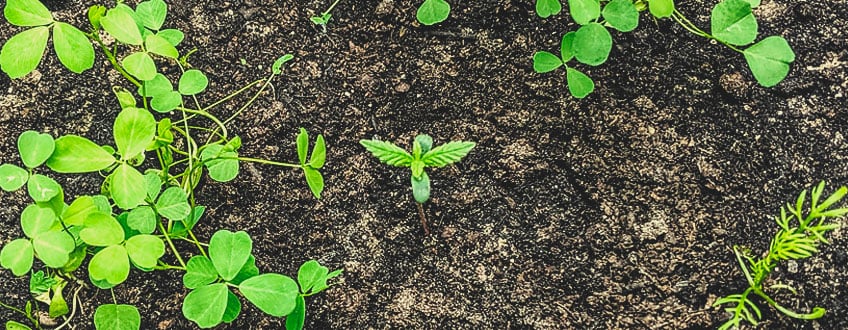
KEY PLAYERS
But it is not only through this interaction that plants take up nutrients. The organisms they attract also help to shape the soil and keep it in optimal condition for healthy growth. Check out some of the most important soil food web lifeforms below:
• Bacteria: These tiny creatures produce slimy substances that keep soil particles stuck together and give the growing medium structure. They also serve as food for larger lifeforms that excrete plant food.
• Fungi: Fungi produce root-like structures (mycelium) that give the soil shape and keep it from crumbling or washing away. Beneficial “mycorrhizal” fungi also link up with plant root systems to improve nutrient uptake.
• Nematodes: They gobble up smaller lifeforms and free up nutrients into plant-available forms. Certain "good" nematodes also keep the "bad" ones away (the latter like to chomp on plant roots).
• Protozoa: These guys graze (like tiny little cows) on bacteria in the soil. Not only do they excrete free nutrients, but their hunting encourages the bacterial population to respond by growing faster.
• Worms: Chill out, we're not asking you to bring worms into your grow room! But, worms are so important in the soil. They take nutrients down into the medium, and their tunnels help to aerate and bring water down to plant roots.
HOW TO PRESERVE SOIL LIFE
Do you see why growing organic cannabis far exceeds simply pouring in nutrients now and then? By growing in a way that looks after all soil life, your soil will become richer and richer with each season.
But how can you achieve this?
Start off by purchasing good-quality organic soil. Once you have it, treat it like a pet (or billions of smaller pets). Horticultural geniuses have developed ways to garden over time that involve minimal destruction of soil life.
Download the Pro Growing Guide for in-depth soil-food-web management, precise mix recipes, and pH/PPM targets that keep your bed or container thriving season after season.
Free Advanced
Growing Guide!
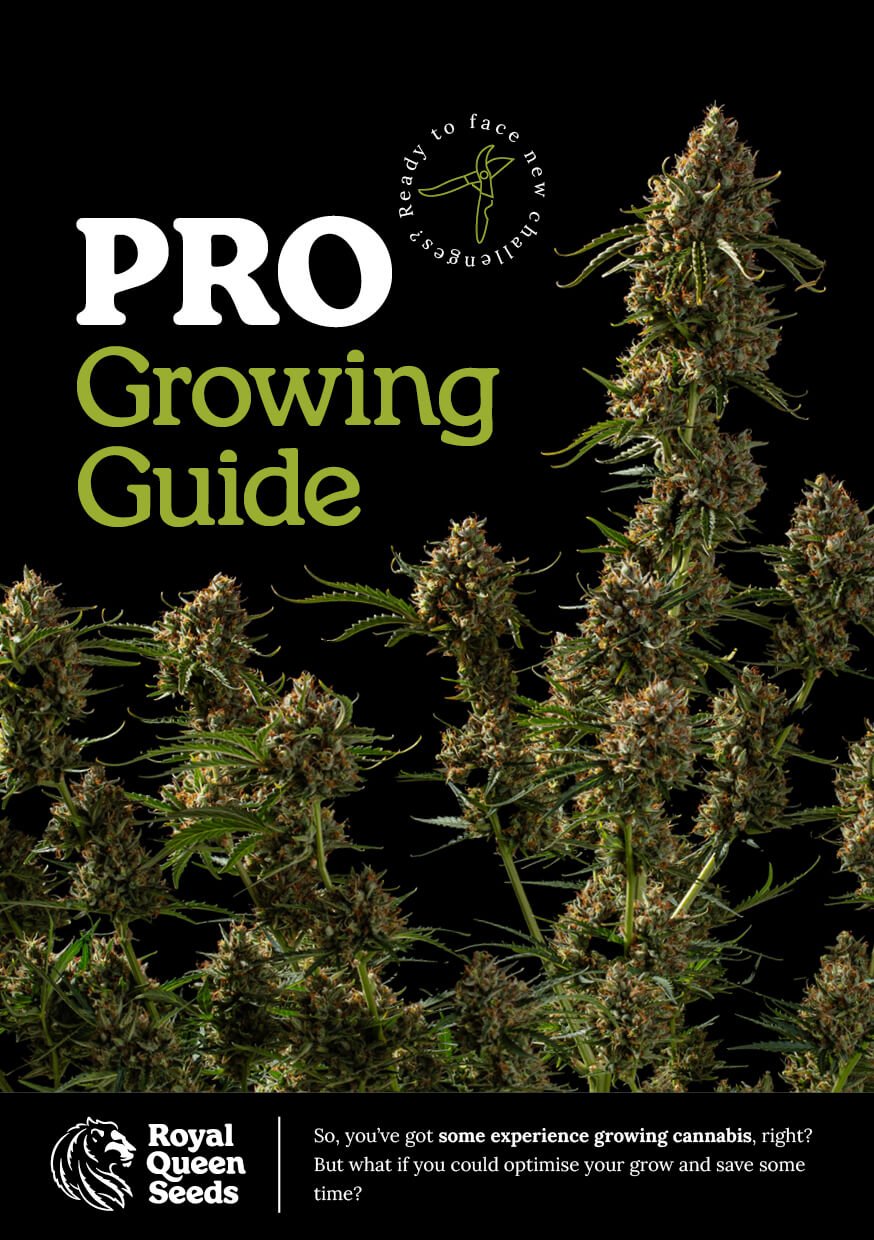
These methods involve avoiding the following actions:
• Tilling: Healthy soil takes a while to build. Tilling and digging can quickly destroy beneficial life. They exist in the soil for a reason. Tilling brings them to the surface and exposes them to UV rays and other harmful factors—quickly killing them. It also breaks up those valuable fungal networks.
• Pesticides/herbicides/fungicides: As their names suggest, these chemicals kill certain lifeforms, many of which are beneficial. As it happens, a healthy soil food web helps to defend against many diseases and pests without the use of poisonous chemicals.
• Chemical fertilisers: These rich sources of synthetic nutrients irritate key life in the soil, such as our worm friends.
Organic no-till (or no-dig) farming aims to avoid the practices mentioned above. It involves creating shallow beds of high-quality soil on the surface, allowing plant roots to penetrate down without disturbing microbial life. The benefits of no-till include:
• Protects the topsoil and beneficial organisms
• Saves time and money
• Slows evaporation
• Keeps carbon locked in the soil
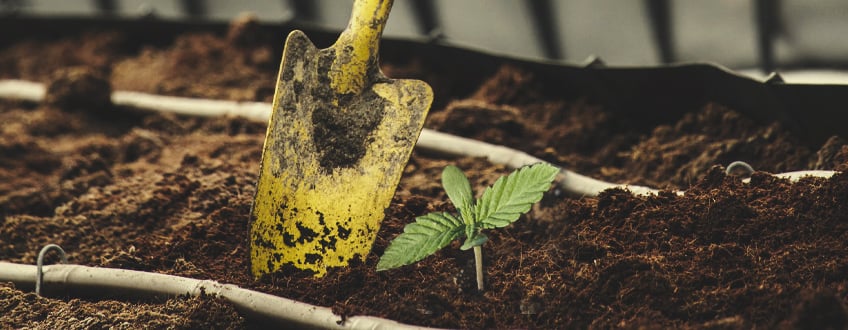
BEDS OR CONTAINERS?
Now that you know how to maintain healthy soil life, you'll need to decide what to grow your cannabis plants in. You have two primary choices: beds or containers.
• Garden beds
Garden beds are large patches of fertile land that allow roots to penetrate deep into the soil. Certain strains, namely monster sativa varieties, can take advantage of this extra space and reach enormous heights. However, outdoor beds remain exposed to the elements. They are relatively hard to defend against excessive rainfall, sudden heat waves, and early frosts.
• Containers
Cultivating in containers allows growers to physically move their plants around as needed. They can be relocated into greenhouses or indoors if the weather takes a turn for the worse. They can also be transported into the shade or sun accordingly.
Not all containers are made equal. Plastic and ceramic containers fulfill the purpose of holding in a growing medium, but they can cause plant roots to behave in a less than desirable fashion. Fabric pots offer the best solution when it comes to this style of growing. They harness geotextile technology to retain adequate water while promoting aeration. This helps to stave off fungal pathogens and dehydration simultaneously.
MACRONUTRIENTS AND MICRONUTRIENTS
Cannabis plants require a varied and complete diet to produce the best results. Much like us humans, they require two main categories of food: macronutrients and micronutrients. Cannabis plants can draw in all of their nutrients from the soil, with three exceptions: During photosynthesis, they "inhale" carbon dioxide through tiny little pores on their leaves (called stomata) and, in combination with water, form sugars, releasing oxygen.
MACRONUTRIENTS
First, let's go over the three nutrients that plants need in large quantities, appropriately known as macronutrients. We'll cover the role of each one, as well as some organic sources.
| MACRONUTRIENTS | SOURCES |
|---|---|
|
NITROGEN • Required for vegetative growth |
• Seaweed • Manure < • Worm castings |
|
POTASSIUM • Needed for photosynthesis |
• Kelp meal • Greensand • Wood ash |
|
SULPHUR • Helps form important enzymes |
• Manure • Hay • Straw |
|
MAGNESIUM • Central atom of the chlorophyll molecule |
• Compost and organic matter |
|
CALCIUM • Involved in plant growth and nutrition |
• Organic compost |
|
PHOSPHOROUS • Plays an important role in energy transfer (ATP) |
• Bone meal • Manure • Rock phosphate |
MICRONUTRIENTS
Plants require micronutrients in much smaller quantities, as their name suggests. However, this doesn't mean they are less important. A lack of any of these minerals and elements can manifest in nutritional deficiencies that impede growth and reduce yields. Get to know them below.
| MICRONUTRIENTS | SOURCES |
|---|---|
|
BORON • Helps build cell walls |
• Eggshells |
|
COPPER • Activates key enzymes |
• Organic compost • Dairy manure |
|
IRON • Key to important metabolic processes |
• Manure • Kitchen scraps • Greensand • Seaweed |
|
MANGANESE • Contributes to photosynthesis, respiration, and nitrogen assimilation |
• Seaweed |
|
MOLYBDENUM • Converts nitrate into nitrite and then ammonia |
• Kelp meal • Greensand • Molasses • Neem meal • Wood ash |
|
ZINC • Key part of enzymes and proteins |
• Kelp (foliar spray) |
PLANT NUTRITION
Giving your plants access to this array of nutrients all boils down to high-quality living soil. Starting with good soil rich in compost and organic matter almost always guarantees a good supply of all of these minerals and elements.
However, cannabis plants rely on the life and death cycle of a thriving soil food web to gain access to nutrients. Roots simply can't pull minerals directly from organic matter. They can, however, conduct the orchestra of the rhizosphere using root exudates.
As an organic grower, you just need to make sure your soil has a good supply of nutrient-rich organic matter in the form of compost/compost teas, worm castings, and other sources. As long as you provide the food, your plants will recruit the soil food web to make their dinner available.
Mycorrhizal fungi are one of the key plant allies that hang out in the rhizosphere. These species form a physical bond with plant roots, attaching themselves to the root system. They feed on plant exudates and, in return, digest organic matter and shuttle specific nutrients into plants.
An array of other soil microbes join the synergistic dance. Keep them well-fed with organic matter, and you'll generate a perpetual cycle of nutrients right under your feet.
ORGANIC VS CHEMICAL FERTILISERS
Fertilisers are added to the soil to enrich the growing medium with nutrients. Organic fertilisers stem from organic matter that slowly breaks down over time until the soil food web renders natural materials into nutrients that plants can uptake.
In contrast, chemical fertilisers are synthesised on an industrial scale. Many of them are by-products of the petroleum industry and tend to be acidic in nature.
All growers need fertiliser of some kind. Plants slowly pull nutrients from the soil and will leave it depleted over time unless cultivators add something back in. Both organic and chemical fertilisers offer pros and cons to cannabis operations. Of course, organic growers will opt for the former, but let's look at the advantages and disadvantages of each for curiosity's sake.
ORGANIC FERTILISERS
Organic fertilisers are natural materials that possess high concentrations of cannabis nutrients. Many of these materials feature elements and minerals locked inside their structures. These include compost, seaweed, worm castings, and bone meal. However, they serve as food for bacteria and fungi that break them down over time, allowing plants to uptake their nutrients.
With that said, growers can make highly concentrated preparations to minimise the time it takes for nutrients to be absorbed. These include compost tea, worm juice, and fermented plant formulas.
Pros:
• Mimic the natural breakdown of organic matter
• Feed life in the soil
• Free of harmful chemicals and totally safe
• Concentrated preparations allow quicker absorption
Cons:
• Compost piles can take up to a year or more to really get going
• Preparations include many different nutrients, making it harder for growers to increase specific minerals or elements
CHEMICAL FERTILISERS
Chemical fertilisers are man-made substances that include many of the macronutrients and micronutrients required by plants. However, they also come hand in hand with numerous additives.
Pros:
• Quickly absorbed
• Specific dosing
Cons:
• Irritate life in the soil food web
• Can burn plants
• Increase air and water pollution
• Acidify the soil
• Deplete minerals from the soil

HOW PH WORKS IN ORGANIC CULTIVATION
Organic growers rarely need to pay too much attention to pH. However, issues can still arise. All soil has a specific pH value. Remember the scale that ranges from 0–14 from science class? Values from 0–6 signify acidity, 7 represents neutral, and 8–14 signify alkalinity.
But why do growers need to care about this? Well, cannabis thrives in slightly acidic soil—between 6–7. If the soil becomes too acidic or too alkaline, roots struggle to uptake nutrients, a phenomenon known as nutrient lockout. Eventually, nutritional deficiencies will occur and plant health and output will be compromised. Growers can measure soil samples using a simple pH tester.
The modus operandi of tackling pH issues used to be the application of synthetic pH “up” and “down” products. However, there are also organic methods to restore soil pH balance:
Acidic soil:
• Baking soda
Alkaline soil:
• Lemon
• Vinegar
COMPOST
Compost forms the very foundation of every organic garden. It allows growers to create their own soil amendments by simply recycling kitchen scraps and garden waste. Microbe-loaded compost piles break down organic matter—anything from sticks and dead leaves to potato peels—into "black gold".
You can use the nutrient-dense material resulting from a “mature” compost pile to dress beds and make potting mixes. Ultimately, composting gives gardeners a bit more independence and draws them closer to a closed-loop system. There are two main forms of composting: slow composting and worm composting.
SLOW COMPOSTING
Some of the most impressive benefits of slow composting include:
• Reduces carbon footprint
• Saves money
• Powerful natural fertiliser
• Improves soil health
Slow composting piles consist of two different types of materials: green and brown. Green materials supply nitrogen, whereas brown materials provide carbon. Aim for a balance of 25–50% green and 50–75% brown to ensure your pile gets enough air to support healthy aerobic microbes.
Green materials include kitchen waste, grass clippings, seaweed, and animal manure. Brown materials include dead leaves, cardboard, straw, and woodchips. A new compost pile can take months to start churning out viable compost. Keep supplying material, and you'll reach a point of perpetual nutrients in the near future.
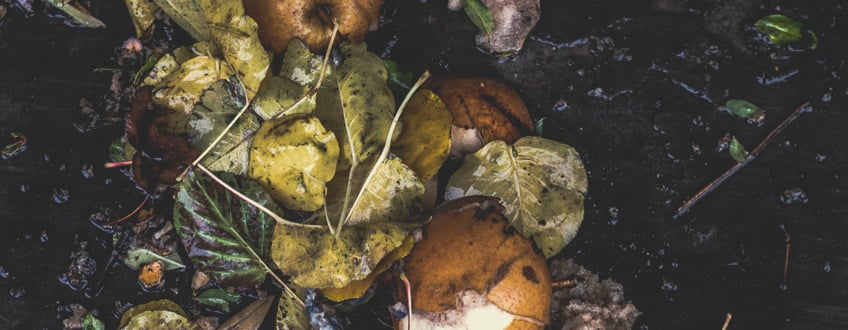
WORM COMPOSTING
Worm composting offers a quicker source of organic nutrients. You can make a simple worm bin using a plastic tote or bucket. Mix some specialized composting worms and a few handfuls of compost. Add a frequent supply of kitchen scraps; your worms will devour it and create worm castings.
Worm castings contain beneficial fungi, bacteria, and minerals such as potassium, calcium, zinc, copper, and phosphorus. It only takes a few weeks for worms to start producing a consistent supply of worm castings. Layer these on your beds and pots to feed the entire soil food web.
Worm composting also produces "worm juice"—otherwise known as worm pee. Install a plastic tap on the bottom of one side of your bin. Drain it every few days and add the nutrient-loaded liquid to your growing medium for a mineral and microbial kick.
MANURE
As the solid and liquid waste of certain animals, manure features an impressive nutritional profile. High levels of macronutrients make manure a key resource in any organic garden. Common manures include chicken, cow, horse, llama, rabbit, and sheep. Adding fresh manure can contaminate your plants and burn them via too much nitrogen. You'll need to rot it down for six months to a year to make it compatible with your garden.
Similar to compost, manure features nutrients bound up in organic matter. This means it also provides food for beneficial microbes. Once they've had their way with it, your plants will scoop up the nutrients during their turn in the cycle. Growers can use manure to enrich compost piles, or apply it as a top dressing.
Want to hear another great thing about manure? It’s easy to find! Check out local farms and garden centers for cheap—maybe even free—manure. Be sure to try and bring home some of the older manure they have to save you a few months of waiting.
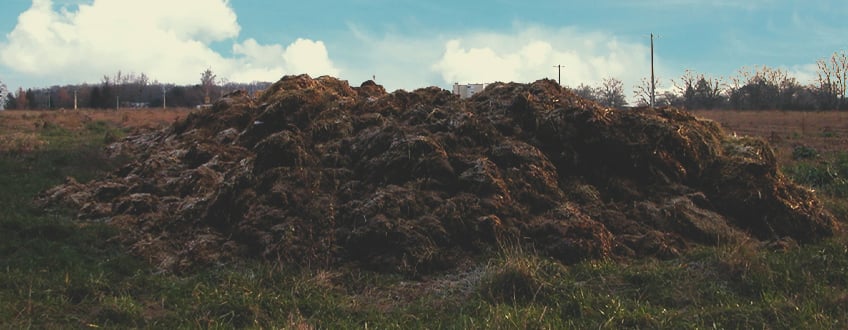
HOW TO FEED CANNABIS ORGANICALLY
Look at that! You now know all about the very best organic food sources for your plants. Below, you'll discover the best ways to feed your cannabis plants using organic methods. These techniques are super easy, and all of them will stimulate some serious plant growth while keeping valuable microbial life intact.
MULCH
Mulching refers to layering your beds and pots with organic matter. Remember when we said microbes don't like sun exposure? Mulching solves that problem, and then some.
Take a walk in your local woods and look at the ground. What do you notice? Rarely will you see exposed patches of bare soil. Layers of dead leaves, sticks, and organic matter create a "skin" to protect the life in the soil below. This matter slowly breaks down over time to feed the soil.
Mulching works to replicate the intelligence of nature. Check out some of the benefits of this practice:
• Feeds plants slowly over the season
• Good food for fungi
• Suppresses weed growth
• Retains moisture
• Keeps some pests at bay
• Adds tidiness to your garden
There are many different types of organic mulch you can choose from. Those below will nourish your garden and boost your soil health:
• Mushroom compost
• Wood chips
• Bark
• Rotted manure
• Straw
• Seaweed
Growers can also use cover crops to produce a "living mulch". By sowing a cover crop mix among your cannabis plants, you'll create a living “carpet” that enhances soil food web health. Cover crops such as fava beans also help to fix nitrogen and boost soil levels. Chop and drop your cover crop as it grows to return organic matter back to the soil.
FERMENTED PLANT JUICE
Fermented plant juice (FPJ) stems from the practice of Korean Natural Farming (KNF). It involves harvesting local plants such as dandelions and nettles that are loaded with nutrients. These species also include beneficial organisms in their leaves, as well as growth hormones. Learn how to make it below.
1. Mash up freshly harvested plants and place in a bucket.
2. Add enough brown sugar to make up one-third of the mix (this will feed the microbes).
3. Stir thoroughly; place some newspaper on top and let sit for one hour.
4. Remove the newspaper and place a heavy brick on top of the mixture to remove excess air.
5. Cover the bucket using cloth and string and let sit in a dark room for two days.
6. Remove the brick and air out the mixture for one hour before covering again.
7. Leave in a dark room for 2–3 weeks.
8. Your FPJ will be fermented and ready for action at this point.
9. Apply as a spray or root drench at a concentration of 0.1–0.2%.
COMPOST TEA
Yet another key tool in the arsenal of organic growers, compost tea provides large quantities of essential nutrients and beneficial lifeforms—from nematodes to bacteria. Making it involves brewing some of your high-quality compost in water.
These are the reasons you should be using it:
• Enhances plant growth
• Introduces beneficial organisms
• Suppresses diseases
• Eliminates the need for toxic chemicals
Have we piqued your interest? Learn how to make your own batch of compost tea here.
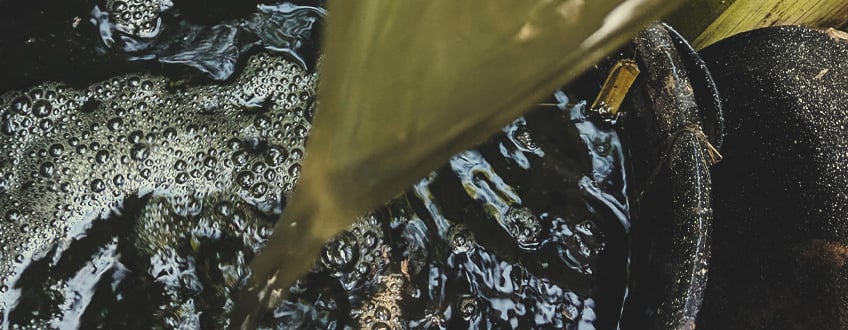
TOP DRESSING
Top dressing is an extremely easy way to add more nutrients to your soil throughout the growing season. Add your first top dressing in early spring, and then again every three weeks to keep your soil topped up and your plants happy.
Kelp serves as a rich source of nutrients and a superb top dressing. Simply layer it over your beds/pots and water it in. Job done!
FOLIAR SPRAYS
Foliar sprays are both nutritional formulas and an organic form of pest control, serving as a rapid way to treat nutritional deficiencies and wipe out pest species.
When applied to the surface of leaves, nutrients are taken in through the stomata, bypassing the root system altogether. Foliar sprays are particularly useful when you're dealing with waterlogged soil, pH imbalance, or other issues that decrease nutrient uptake at the roots. Compost tea, worm juice, and FPJ can all be applied using this method.
Aloe vera also makes a fine foliar spray. The plant helps to boost nutrient absorption and reduce pests and disease. Natural substances such as neem oil can also be applied as a foliar spray to combat fungal pathogens such as powdery mildew.
SUMMARY
You're ready to raise a successful cannabis crop using purely organic methods! Not only will you achieve epic harvests, but you'll build up soil health and your own supply of compost over time. Before you head out into the garden, let's go over the main points we covered:
• Utilise no-till to maintain soil food web life and structure.
• Nutrients matter! But you can supply all of them without chemicals when using high-quality compost and top dressing.
• Check your pH from time to time, and use natural methods to adjust it.
• Put your kitchen and garden waste to use. Build compost using slow and worm methods.
• Manure is easy to find and will do wonders for your garden.
• Mimic nature by mulching.
• Compost tea, foliar sprays, and FPJ deliver immediate doses of microorganisms and nutrients.
Use these techniques to work in harmony with nature, not against it! Now, go on and grow, and may your harvests be plentiful!


























